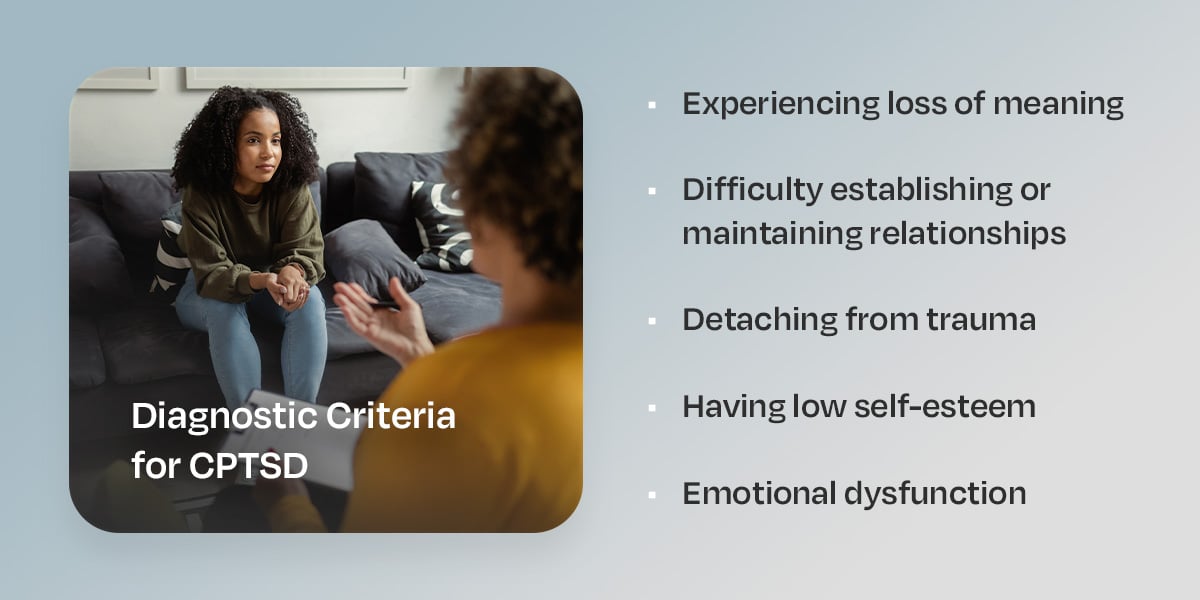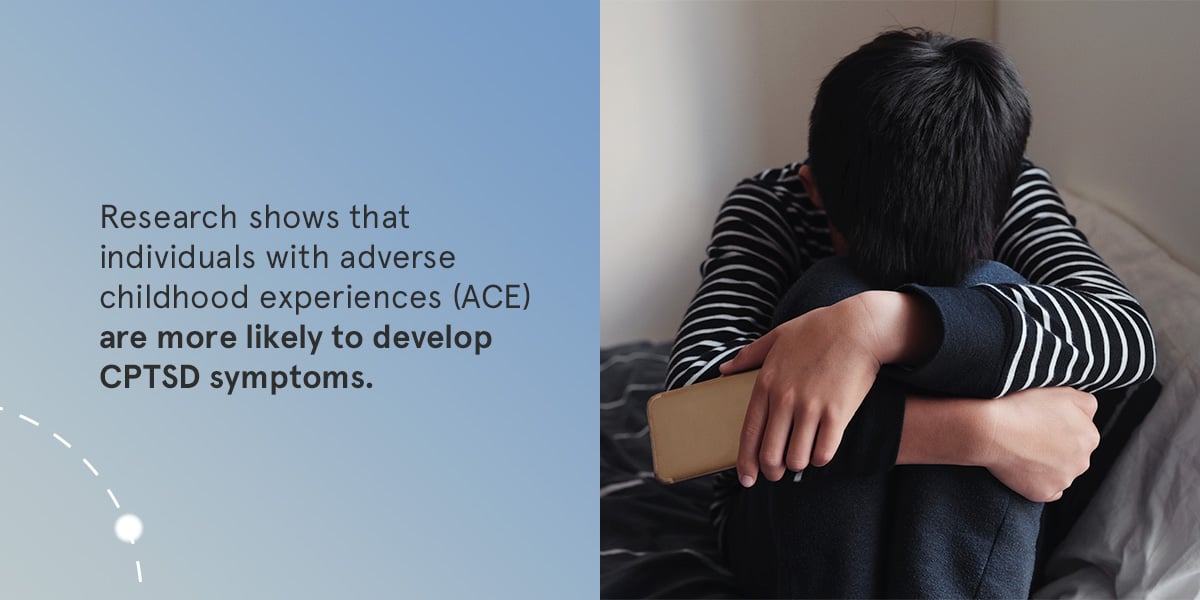What Is Complex PTSD?

If you think that you may be experiencing symptoms, take this PTSD test online or speak to a Care Advocate now directly by calling (908) 293-7559.
By: Shauna 'Doc' Springer Ph.D., Stella Chief Psychologist
While Stella prefers the phrase Post-Traumatic Stress Injury (PTSI), we reference Post-Traumatic Stress Disorder (PTSD) throughout this article, as many people still use the term and are more familiar with it. We encourage all readers to adopt the updated terminology to help end the stigma surrounding this condition.
In the last decade, many of Stella's patients identify a meaningful difference between PTSD and Complex PTSD. This article will describe the difference that is meant by patients who draw a distinction between these two concepts. You'll learn how Stella views the concept of "Complex PTSD" as a discrete challenge relative to classically defined "Post-Traumatic Stress Disorder."
Complex PTSD (C-PTSD or CPTSD) is often described as a form of PTSD with additional symptoms and multiple layers of trauma. Though it has not been determined whether CPTSD and PTSD are entirely separate conditions, the term CPTSD is used to categorize prolonged, repeated and more complex traumas.
For many of Stella's patients, the distinction between CPTSD and PTSD helps validate their early-life and adulthood experiences with trauma on various levels. Anyone who feels they may be experiencing symptoms of CPTSD is invited to book an assessment at Stella today to learn about our cutting-edge trauma care.
Diagnostic Criteria for CPTSD

A CPTSD diagnosis starts with a licensed expert assessing if the person is experiencing core symptoms of PTSD:
- Presently re-experiencing their trauma with nightmares, flashbacks or intrusive memories.
- Avoids internal and external reminders of their trauma.
- Feels a persistent sense of threat, resulting in startle reflexes and hypervigilance.
The CPTSD diagnosis requires at least one symptom from each of these categories above, as well as disturbances in self-organization (DSO), which can impact one's self-image and dysregulation. DSOs are intended to describe the psychological disturbances individuals experience after exposure to multiple and repeated traumas. The DSO symptom clusters include:
- Difficulty calming down, feeling numb
- Having a negative self-concept
- Difficulty feeling close to others
Additional DSO symptoms may include thoughts such as "I feel like a failure," I feel worthless," "I feel cut off from people" or "I feel numb or emotionally shut down." The presence and severity of these symptoms can be assessed through the ICD-11 trauma interview, a diagnostic process that measures symptom scores on a scale of zero to four, ranging from the following options:
- Absent
- A little bit
- Moderately
- Very much
- Extremely
An individual with CPTSD might have other severe symptoms that relate to their trauma that could lead to a diagnosis, including:
- Experiencing loss of meaning: Traumatic events can cause a person to reevaluate or lose their core values, religion, beliefs or hope in the world. Those with CPTSD may feel that there is no meaning to their lives and experience suicidal ideation or thoughts.
- Difficulty establishing or maintaining relationships: Trauma often makes people distrustful of others or feel that no one truly understands what happened to them. This can lead to avoiding romantic and platonic relationships or finding them difficult to maintain. Some may also develop unhealthy relationship attachments as a result of their trauma.
- Detaching from trauma: Those who experience repeated trauma may cope by disconnecting from themselves, known as depersonalization, or from the world, known as derealization. These dissociative symptoms often cause significant impairment in all areas of life.
- Having low self-esteem: Individuals with CPTSD may blame themselves for their trauma. The individual may have extremely negative feelings about themselves or feel they are very different from other people. They may also experience feelings of worthlessness and shame or believe they are the cause of bad things happening.
- Emotional dysfunction: Complex PTSD can make it difficult for an individual to control their emotions. Though someone may struggle to feel happy, feelings of anger and sadness are extremely intense. They may express inappropriate emotions or feel like they're living in a dream.
Mental health professionals may also make a diagnosis of PTSD instead of complex PTSD since there is no specific assessment for this condition.
How Does CPTSD Differ From PTSD?

In modern times, we understand that PTSD/PTSI is also caused by ongoing stressors or repeated trauma, although it has historically been defined as being caused by a single traumatic event.
While it's not a one-size-fits-all situation, some general examples can help individuals learn how to explain CPTSD to someone who doesn't have it. For instance, a person who suffers from flashbacks of a certain event or specific triggers — such as a car accident — may align more with a PTSD diagnosis. However, in this context, it's important to note that professionals use the term "Post-Traumatic Stress Injury" (PTSI) to highlight trauma that relates to severe injuries or stressful events where an individual's life was threatened.
Symptoms of complex PTSD were originally focused on childhood trauma. However, prolonged exposure to traumatic events during adulthood is strongly linked to CPTSD. Individuals can also understand complex PTSD by comparing it to other mental health challenges like depression. Everyone experiences stress, sadness or depression to some degree. However, when levels of these emotions come to impact daily living and hinder the ability to navigate life, that is when they become clinical diagnoses, such as Major Depressive Disorder. That said, a person can experience trauma and not develop PTSD or CPTSD.
What Causes Complex PTSD?

As with its diagnostic criteria, there is no clear cause of complex PTSD. Just like PTSD, this condition can be caused by various experiences, including:
- Physical, sexual or emotional abuse
- Neglect
- Recurring bullying
- Caregiver separation or divorce
- Exposure to family member addiction
- Witnessing violence
- Long-term bias, prejudice or discrimination
- Experiencing war
- Being a victim of human trafficking
- A perceived or real threat of injury, violence or death
People may be more likely to develop CPTSD if they:
- Experienced trauma at a young age
- Experienced multiple traumas
- Were traumatized or harmed by someone they trusted
- Were unable to escape from a traumatic situation
- The traumatic experience lasted for a long time
Research shows that individuals with adverse childhood experiences (ACE) are more likely to develop CPTSD symptoms, including relationship difficulties and negative self-concept. Because ACEs have negative, lasting effects on an individual's health, those with these experiences may have a higher risk of chronic diseases, cancer and other complications, which can exacerbate mental health symptoms.
The psychological impact of repeated trauma in early childhood can also shape one's personality. Certain behavioral characteristics may be explained by such traumatic experiences. Recent studies revealed that trauma can even change a person's DNA, leaving a chemical mark on their genes. Identifying the underlying causes, factors and contributors of CPTSD can help destigmatize the mental health challenges that individuals develop as a result of their trauma and help them heal.
Can Complex PTSD Be Triggered?

A trigger refers to anything that can cause an individual to relive a past trauma, almost as if they are still experiencing it. In the context of a mental health challenge like complex PTSD, a trigger is generally anything that elicits an intense reaction or worsens symptoms. Triggers are related to the original trauma a person has experienced, which is why it's different for every individual.
Some general complex PTSD triggers include:
- Temperatures
- Locations
- Sights
- Smells
- Sounds
- Feelings
- Crowds
- Bright lights
- Hearing specific phrases or actions
- Being exposed to yelling or being yelled at
Those with CPTSD may also experience triggers associated with specific situations, whether someone consciously remembers those situations or not. Examples include:
- An anniversary of a traumatizing event
- A holiday
- A season
- A celebration, such as a birthday or graduation
- A time of day
- A specific place, such as a church, hospital or dentist's office
- A physical sensation, such as pain
- A reminder of trauma, such as a book or movie
CPTSD can also be triggered by internal, emotional experiences, such as:
- Feeling helpless, confused or guilty
- Feeling misunderstood or invalidated
- Feeling unworthy or inadequate
- Difficulty separating feelings from thoughts
- Feeling disengaged or disconnected from one's body
- Lacking boundaries with others
- Being blamed or yelled at by someone
- Being touched without permission
- Feeling a lack of safety in one's body
Typically, those with CPTSD can become triggered by too much stimulation in their environment, such as attending a crowded mall or concert with loud sounds, lights and people. As with any symptoms of a mental health condition, these symptoms may vary in frequency and severity. For some, triggers will be obvious. For others, they can be more subtle and activate an emotional response that a person internalizes. Triggers can be extremely difficult to avoid, which is why it's important to identify them and learn coping mechanisms.
Is Complex PTSD a Disability?

In some contexts, CPTSD may be considered a disability. According to the Americans With Disabilities Act (ADA), people with severe PTSD may receive legal protections and workplace accommodations. Whether or not a person's PTSD or CPTSD is considered a disability depends on their individual assessment, symptoms and preferred language. For example, if an individual has symptoms that significantly impair or limit their ability to function or complete daily activities, such as communicating, reading, concentrating, walking or sleeping, they may receive assistance.
On a personal level, however, some individuals with CPTSD would not like to refer to it as a disability regardless of their symptoms or needs. It's always advisable to ask each person about the terms they prefer to use when speaking about their condition.
Does Complex PTSD Ever Go Away?
Because CPTSD is a stress-related condition that occurs in response to prolonged trauma, there's no definitive answer. Some people with PTSD may find relief in six months, a year or longer, depending on the individual. Those with CPTSD may find it to be a lifelong condition or find relief with a specific treatment.
What Are the 4 F's of Complex PTSD?
When an individual suffers from CPTSD, they may often experience a trauma response when they're triggered. Everyone has a "fight or flight" response when encountering a perception of or an actual threat. However, for those with CPTSD, the reaction can be different. When they encounter a trigger, the initial reaction may be one of the following trauma responses:
1. Fight

Some people automatically try to protect themselves against fear, pain or stress — known as the fight response. Both the fight and flight response are typically observed or acted on when someone feels like they have a chance, oftentimes real, to remove themselves from a situation. When facing a threat, an individual with CPTSD may try to defend themselves through conflict in order to gain a sense of security and control. While being assertive and knowing how to protect oneself are vital skills, the fight response can become extreme in people who have experienced long-term trauma, resulting in:
- Controlling behavior
- Bursts of anger
- Crying
- Showing aggression or the desire to be aggressive
- Curling hands into fists, kicking or smashing
- Grinding teeth
- Holding others to unrealistic expectations
2. Flight
Often considered the opposite of the fight response, the flight response refers to when an individual tries to protect themselves by escaping or "fleeing" the situation. While those who use the fight response tend to go "through" the conflict, people who engage in the flight response try to avoid it completely.
People with CPTSD may have the flight response if they consistently run away from their problems, struggle to express or defend themselves or hide and panic when they feel threatened. They might be more likely to develop the flight response if escaping the situation is what makes them feel safest.
Individuals with this CPTSD trauma response may have:
- Restlessness or the need to rush
- Darting eyes
- An inability to keep their hands or legs still
- A feeling of being trapped
- A desire to hide
- Shallow breathing
3. Freeze

Also referred to as the dissociative response, the freeze response occurs when someone protects themselves by shutting down physically, mentally or emotionally. Both the freeze and fawn responses are often seen when people have no escape from a situation and are doing what they can to survive it since they can't leave.
Examples of the freeze response include:
- Dissociating during a stressful experience
- Having brain fog or memory loss
- Feeling numb or a sense of dread
- Having a sense of stiffness or heaviness
- Feeling cold and having pale skin
4. Fawn
The last trauma response is one many may not be familiar with. When triggered, individuals who implement the fawn response often turn to people-pleasing to avoid or mitigate conflict. These people may have extreme difficulties with expressing themselves for fear of what others might think about them.
The fawn response may also be present in people who have trouble saying "no" to others or are overly accommodating to other's needs while neglecting their own. People with CPTSD who engage in the fawn response tend to think, "If I please this person, I will be safe from pain."
Examples of the placation trauma response include:
- Overextending oneself to meet the needs or demands of someone else
- Losing a sense of self
- Having a lack of boundaries
- Avoiding conflict
- Engaging in codependent relationships
- Pretending to agree with others
- Over apologizing
- Excessively flattering other people
It's important to note that some people may have an overactivation of their trauma responses, causing extreme behaviors even in non-life-threatening situations. It's important that those who experience this know there's treatment available to provide relief. They can start by taking a complex trauma test to determine if their symptoms align with complex PTSD before exploring treatment options.
It's important to note that, while online screening tools can be helpful in determining if symptoms of a mental health condition are present and provide guidance for treatment, they are not meant as a diagnostic tool. Only a mental health professional can properly diagnose a mental health condition.
Common and Alternative Treatments for CPTSD

Trauma-informed talk therapy is a common treatment for PTSD and CPTSD. Trauma-informed care is individualized to each person's specific experiences and needs. This type of therapy focuses on identifying the central trauma or traumas and its potential effects on one's mental health, behavior and ability to engage in other types of treatment.
The goal of this treatment is to support individuals in being understood, supported and secure.
Mental health professionals help people understand:
- How the body responds to trauma
- How to develop healthy coping skills
- What individuals can do to manage symptoms
In some cases, many increase their well-being by combining psychological and biological interventions. A skilled therapist can create personalized therapeutic techniques using conventional and alternative treatments, including:
- Dual Sympathetic Reset, an advanced Stellate Ganglion Block (SGB) protocol
- Ketamine-assisted treatment
- Psych-medical sessions
- Integration sessions
These cutting-edge modalities may provide relief for PTSD and CPTSD.
Common Symptoms of CPTSD?
CPTSD and PTSD are physical injuries that can be treated biologically by calming the nervous system. Stella's CPTSD Symptom Quiz is a brief assessment that measures symptoms related to post-traumatic stress, depression, anxiety and stress. This online quiz can gauge symptoms relating to PTSD, anxiety, depression and stress to help individuals understand if they may be a good fit for Treatment by Stella.
Stella is a leader in treating symptoms of emotional trauma and mental health challenges with innovative treatments like the Dual Sympathetic Reset (DSR), an advanced Stellate Ganglion Block (SGB). Those seeking more information about DSR SGB can speak to a care advocate by calling 908-293-7559.
